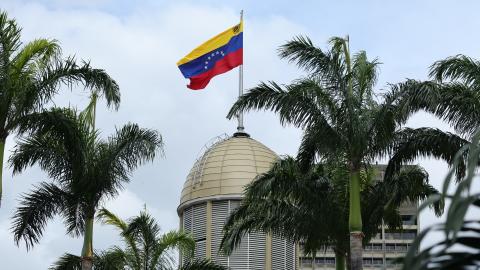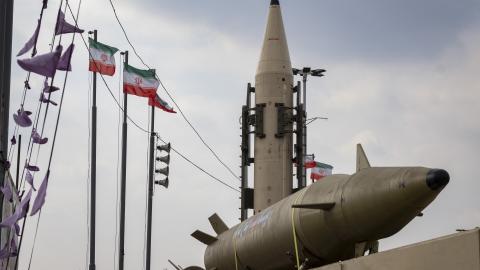For anyone concerned about the future of Islam, the official results of Indonesia's April 5 parliamentary elections are both encouraging and disturbing.
They are encouraging because the country that, with 220 million people, has by far the largest population in the Muslim world has strengthened its democracy by holding a second consecutive set of free elections — elections with a voter turnout of 84 percent, and elections described by European Union monitors as having "credibility and integrity." In addition, Indonesia is holding resolutely to its open brand of Islam. Nationalist and moderate Muslim parties won two-thirds of the vote; radicals received only 10 percent.
But the results are also disturbing because the elections produced a wildly fragmented vote that, combined with Indonesia's complex electoral and party systems, provides major opportunities for extremists to advance their agendas. Though the radicals' numbers are small, they are determined, well organized, well funded, and have a focused agenda, so that they can outmaneuver, and sometimes intimidate, their larger but flabbier Muslim and nationalist opponents.
Golkar, a patronage party established by strongman Suharto — who ran the country from 1966 to 1998 — led the way with 22 percent of the vote, while the nationalist Indonesian Democratic Party of Struggle (PDI-P) of current President Megawati Sukarnoputri garnered 19 percent. But with only about one-fifth of the vote each, they both desperately need allies in order to pass any legislation, and to elect a presidential candidate, they must eventually get over half of the vote in the forthcoming July 5 presidential election or in a runoff on September 20.
Since Golkar and PDI-P will not support each other's candidates, they must seek allies elsewhere, meaning that the host of smaller parties will be the power brokers. Some of them are committed to an extremist Islamist agenda, while others will opportunistically support the extremists to gain electoral advantage. They will certainly demand — and, in the past, have been able to get — a high price for their support.
The radical Crescent Star party again received less than three percent of the vote, but in 1999 it managed to leverage the same total into securing the appointment of its leader, Yusril Mahendra, as the (ludicrously misnamed) "Minister of Justice and Human Rights." Mahendra has pushed legislation to bar doctors from treating people of a different religion, to forbid inter-religious marriage, and to require people to "to uphold the teachings and values of his respective religion." Words "repugnant...to a religion" could bring a five-year sentence. Faiths such as Confucianism or animism would be banned entirely.
Another Islamist group, the Prosperous Justice party, has gone from 2 percent in the 1999 elections to 7 percent now, and is likely to become a major player. Its principal demand is, like the Crescent Star party, to introduce an extreme version of Islamic law (sharia).
Current Indonesian Vice President Hamzah Haz, head of the United Development party, which gained 8 percent, has openly courted the radicals. He has visited the prison cell in Jakarta of Abu Bakar Bashir — widely regarded as the mastermind of the October 2002 bombings in Bali that killed 200 people — and has hugged him warmly, and has defended him, while at the same time accusing America and Australia of being the real terrorists. Amien Rais's National Mandate party, which gained six percent, has also made overtures to extremists. Even Golkar, which has little real agenda of its own, has made sympathetic noises about Islamist legislation.
Hence, Islamic extremism, though small in Indonesia, will continue to wield disproportionate influence. In a country already facing economic difficulties and hobbled by widespread corruption and a major terrorist threat, the results could be destabilizing. The terrorist Laskar Jihad group, whose announced goal is killing Christians, has regrouped and, in the last month, has sent hundreds of its paramilitaries to the Ambon area to intervene in the religious strife there. Radicals are trying to enforce Islamic law in Sulawesi, Sumatra, Eastern Java, Banten, Flores, Sumba, and the Bandung area. They force women to wear hijabs, attack nightclubs, force shops to close at prayer times, and stone moving vehicles. Dozens of churches have been destroyed or closed, and there are repeated bombings: 13 in Sulawesi in February alone. There are also indications that several of the perpetrators of the March 11 Madrid bombings were trained in Indonesia.
These elections, and the subsequent jockeying for power, are key not only for Indonesia, but for the Muslim world at large and, hence, for the rest of the world. Indonesia's brand of Islam has long been open and tolerant (the words "Unity in Diversity" are engraved on its national emblem), and it is the major alternative to the extremist versions being exported by Saudi Arabia and other nations. It is an Islam at home in the modern world, and skilled at living with non-Muslims. If, in the aftermath of these elections, the Indonesian majority is held electoral hostage by radicalism, hopes for reform elsewhere in the Muslim world will be dangerously diminished.














